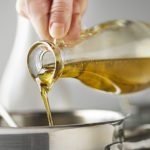On May 25, 2010, the FDA issued a warning to consumers that high doses or long-term use of proton pump inhibitors may increase the risk of fractures of the wrist, hip or spine. Proton inhibitors are drugs that suppress the secretion of stomach acid and are used in the treatment of peptic ulcers, acid reflux, frequent heartburn, and associated conditions. I could say, “I told you so.” In fact, I probably just did. In any case, it’s good to see the FDA catching up with common sense.
Proton pump inhibitors are sold both over-the-counter and by prescription. Prescription varieties include esomeprazole (Nexium), dexlansoprazole (Dexilant), omeprazole (Prilosec, Zegerid), lansoprazole (Prevacid), pantoprazole (Protonix), and rabeprazole (Aciphex). Over-the-counter varieties include omeprazole (Prilosec OTC, Zegerid OTC) and lansoprazole (Prevacid 24HR). According to Dr. Joyce Kovak, FDA’s Division of Gastroenterology Products Deputy Director for Safety, “Epidemiology studies suggest a possible increased risk of bone fractures with the use of proton pump inhibitors for one year or longer, or at high doses. Because these products are used by a great number of people, it’s important for the public to be aware of this possible increased risk and, when prescribing proton pump inhibitors, health care professionals should consider whether a lower dose or shorter duration of therapy would adequately treat the patient’s condition.”
The increased risk of fracture is no trifle. In a University of Washington study, pharmacologist Shelly L. Gray and colleagues followed 130,487 women over an average of eight years. They found a 25 percent increased risk of fracture among these women.
As I’ve written before, by suppressing the secretion of stomach acid, proton pump inhibitors reduce the body’s ability to absorb minerals. Stomach acid — specifically, hydrochloric acid (HCL) — plays a critical role in separating minerals from the foods that bind them. Unfortunately, supplements don’t compensate for those lost minerals, because low HCL levels allow the minerals to combine with other substances, and so they become more difficult for the body to absorb. Low HCL levels particularly inhibit the absorption of iron, zinc, and calcium, making deficiencies a highly likely outcome of long-term proton inhibitor use.
But this is hardly news. A 2009 study showed a number of “unexpected consequences” of proton pump inhibitor use. In addition to increased risk of fracture, the study pointed to altered B-12 and iron absorption, increased odds of contracting pneumonia, and increased odds of C. difficile infection. These potential consequences add up to a high price to pay — considering that there are equally effective natural alternatives.
The C. difficile infection issue is telling. You might be familiar with C. difficile as the culprit in the sometimes deadly infections that have accompanied the use of antibiotics. A bacterium that is normally found in the body, C. difficile is usually kept under control by gut flora and normal levels of HCL in the stomach. But under conditions of low stomach acid, this harmful bacterium thrives and can create dangerous infections. C. difficile causes severe diarrhea, is hard to treat, and again, can cause fatal complications. A Beth Israel Deaconess Hospital study conducted in Boston looked at more than 100,000 patients discharged from the hospital over five-year period. The study found that among these patients, infections with the C. difficile bacterium increased by 366 percent as doses of proton inhibitors increased. At the Boston Medical Center, another study of 1,166 patients being treated for C. difficile infections found a 36 percent risk of recurrence of the infection among patients taking proton pump inhibitors.
The real problem is that proton pump inhibitors do what so many other drugs do: suppress symptoms rather than address the actual causes of the condition. Mess with the balance of the body and you get symptomatic relief along with a host of other, perhaps far worse, problems.
So what’s an acid reflux sufferer to do? Fortunately there are effective, natural alternatives.
- You can supplement with a good digestive enzyme formula to reduce the need for stomach acid.
- Take a teaspoon of apple cider vinegar mixed with water and a little honey at each meal.
- Drink less with your meals. Fluids dilute stomach acid, which triggers the stomach to produce more to compensate.
- Eat less at one time. This allows the body to digest your meal with lower levels of stomach acid required.
But to really understand the issue of proton pump inhibitors and stomach physiology, check out Your Stomach, Part 3.
:hc












It might be important to go into the fact (to the best of my knowledge) that these drugs create a dependency and if suddenly dropped, actually cause a severe over-acid reaction worse than the original. I know this happens with Prozac and other spychotropic drugs and can take over a year to come off in the correct way. I do not have any knowledge of the right way to reduce and eventually eliminate this proton pump inhibitor. It is insidious that too sudden cessation of some drugs actually causes a new condition with the same symptoms that are worse than the original.
I have a question:
How is the action of PPI’s restricted to just parietal cells (that make the acid) in the stomach? In other words, don’t ALL cells of the body have “”proton pumps””, and why wouldn’t they also be affected?
David Kincade
David:
There is actually a variety of proton pumps in the human body — all based on different protein molecules. The gastric hydrogen potassium ATPase (or H+/K+ ATPase) is the proton pump of the stomach, which is primarily responsible for the acidification of the stomach contents. Bottom line: proton pump inhibitors work only in the stomach.
I am currently on PPIs due to
I am currently on PPIs due to severe burning pains in my stomach and centre of abdomen (brought on I think, by taking a HCL supplement with each meal). I have also got a suspected gallstone problem (awaiting ultrasound) and on taking a PPI yesterday I noticed a pain in my right side(/gallbladder area).
Doing a little research I found this: Proton Pump Inhibitor May Reduce Gallbladder Function http://www.medscape.com/viewarticle/503676 (you may need to register an account to view the study). I thought it might be of interest to you and your readers, here’s a short quote:
“Results at 30 days showed that omeprazole therapy was associated with a decrease in gallbladder motility in 79% of patients; overall, mean GBEF decreased by 13.6% compared with baseline (42.8% ± 32.3% vs 56.4% ± 30.0%; P < .01)."
Thanks for the link. It would
Thanks for the link. It would seem that the problems associated with PPIs just keep coming. And for more on why PPIs present such a problem for your body, be sure and check out http://www.jonbarron.org/article/your-stomach-part-3.
I was prescribed Protonix 40
I was prescribed Protonix 40 mg 2x a day for stomach pain.
It worked great for the 1st week and I discontinued.
The pains returned and I took as needed after app. the 3erd time I was covered in hives but did not correlate the to. The next time I took this mediaction I went into a full blown antifaltic shock (3 hours after I took the dose) and ended up almost dying. Please be careful w/ this mediaction.
Perhaps you can advise please
Perhaps you can advise please. I have been on Lansoprazole (low does 15 mg per every other day) for the last 7 years due to having a successful ‘Whipples’ operation. The reason I take these antacids is that I have ‘joins’ in my intestines which are susceptible to ulcertation, although I have never had a problem. If I don’t take the prescription drugs I have acid reflux, but I have had side effects from these antacids weekly, and want to find an alternative natural solution. I eat extremely healthily, and do not eat fatty foods or acid-based foods. I teach yoga and am fit and healthy! Is there an alternative I can take? Please help! Many thanks. Sandra
You might find the following
You might find the following article useful: http://www.jonbarron.org/article/your-stomach-part-3
I have been on Lansoprazol 30
I have been on Lansoprazol 30 mg for at least 5 years. I suffered a pelvic fracture last year which healed ok. I’m 70 and have been diagnosed as “osteopenic”. I take 1200 mg/ day of Calcium Citrate (with Magnesium and D3). I have a hiatal hernia (small) but suffer terrible reflux, often even though I have been taking a PPI for years. I often have to take a Tums at bedtime in order to sleep. I am worried about the risk of fracture as I age and possible low Magnesium levels. I exercise regularly (including lifting weights and walking about 2 miles a day) plus yoga twice a week. Please advise if there is an alternative to PPIs that is safer and will still help my reflux.
I have been on PPI for 10+
I have been on PPI for 10+ years and have a hx. of an esophageal ulcer, also have a hiatal hernia. I have heard about Aloe vera juice, honey, oatmeal, and others. Please offer some useful advice. I like the idea of smaller meals, but when I go to bed I wake up in the middle of the night hungry. So I eat a banana. I need help. Please advise.
For obvious legal reasons, we
For obvious legal reasons, we cannot diagnose or prescribe for specific medical conditions – merely provide information. With that in mind, you might find the following two article useful.
Greetings 🙂 I am a heart
Greetings 🙂 I am a heart patient but I want to stop using pantoprazole. what kind of natural healthy food (ftuit, vegetable, herbs) can I use instead?
I have been on and off
I have been on and off dexliant for many years. I also realize
when I go off the medication, the nausea returns with a vengeance. I eat small meals, no spicy foods and have tried OTC drugs with out success. I am concerned about the issues with bone density, any suggestions would be appreciated.
I use to have heartburn after
I use to have heartburn after eating, usually farinaceous dishes. I took PPI when i had those heartburns. Someone told me to eat a green apple whenever i have heartburn and it actually stop the pain. I always eat an apple after a meal now. Try it !!!
The thing i am struggling now i a kidney pain when i drink alcohol, sometimes even a small amount of beer and the pain last for days and i heard that beer is good for the kidney and PPI treatment might heal the pain so am confused!
Here is a great article about
Here is a great article about the kidneys: https://jonbarron.org/detox/barron-report-kidney-blood-cleansing-4
Please could anyone advise me
Please could anyone advise me I am very worried. I have been on 30mg of Lansoprazole each morning as I suffer with nausea & light headedness due to a Sliding Hiatus Hernia, I have been on this med for over a year, I am 64 year old lady, I am over weight, exercise is difficult due to gynae problems but I do try. I have cut out caffeine, raised head of bed & followed all the advice. I am ok on Lansoprazole & it works but my hair is coming out, its wispy, thin & dry & its hard to cover scalp now. Its upsetting me so much & my GP doesn’t seem to understand, can any of you advise please, I stopped taking meds once & symptoms kept me off work for weeks.